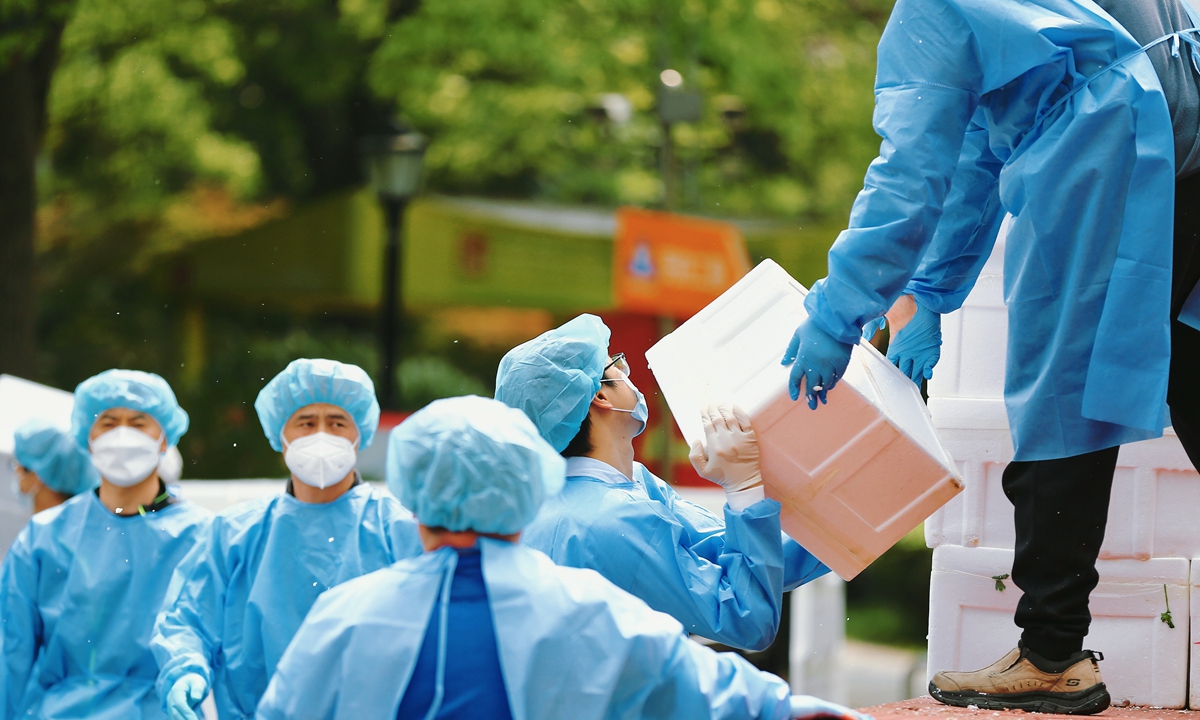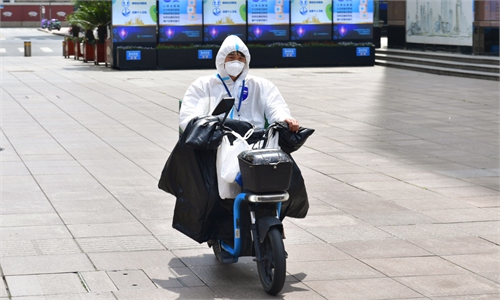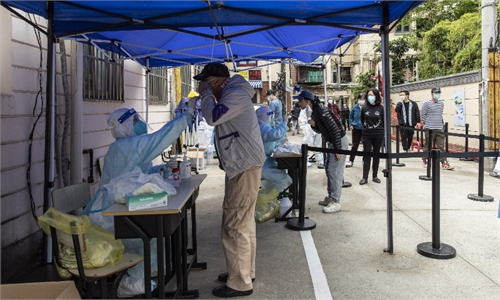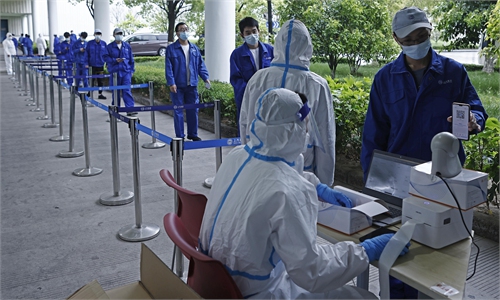Shanghai flare-up develops at 'high level,' sees increasing cluster infections at construction sites

Volunteers in Shanghai distribute commodities to residents Photo: VCG
After more than one month's fight against the Omicron variant, a Shanghai health official said on Sunday that the local epidemic is still developing at a high level, with more than 20,000 new infections and 39 new deaths being recorded the previous day.
Given this, health experts suggested the city conduct mass nucleic acid testing more frequently and on a wider scale to quickly discover new infections and prevent community infections.
Shanghai registered 1,401 local confirmed cases and 19,657 asymptomatic infections on Saturday, Zhang Dandan, deputy director of Shanghai Municipal Health Commission, said during a press briefing on Sunday, noting that the epidemic situation remains grim and complicated with the daily tally of new infections still high.
The epidemic is fluctuating at high levels with cluster infections at some construction sites and enterprises increasing amid business resumption, despite the fact that coronavirus infections at community level are dropping and more patients are being discharged from hospitals, Zhang said.
Usually, a local outbreak would start to quiet down after about one or two incubation periods (seven to 14 days) following epidemic prevention and control management. If Shanghai still sees a high level of new infections, it might hint that community transmission is still quietly spreading in the city, Lu Hongzhou, head of the Third People's Hospital of Shenzhen, told the Global Times on Sunday.
Shanghai, the engine of China's economic development, is ramping up business resumption, which is viewed by many observers as a trailblazing yet arduous pursuit to explore and redefine the delicate balance between epidemic control and economic activities.
Speaking of how to smoothly promote economic resumption while ensuring it would not worsen the epidemic, Lu suggested that Shanghai conduct mass nucleic acid tests more often and on a wider scale, especially at high-risk groups.
For example, for workers at construction sites, nucleic acid testing can be conducted every day to promptly detect potential infections and prevent cluster outbreaks, said Lu.
According to Zhang Dandan, 39 new deaths were registered in Shanghai on Saturday and a total of 160 severe cases and 19 critical cases were receiving treatment.
All these 87 cases had COVID-19 combined with severe chronic diseases of multiple organs including advanced malignant tumors, serious cardiovascular disease and nervous system diseases.
Except for five cases, most of these patients were not vaccinated and their conditions progressed rapidly after they were hospitalized. They eventually died despite treatment and the immediate causes of the deaths were the underlying diseases, the official said.
However, Shanghai is still witnessing comparatively fewer deaths and severe cases compared with some foreign countries and regions facing the same Omicron dominance, thanks to the dynamic zero-COVID policy that China has been upholding.
For example, in the US, the average deaths on Saturday stood at 366 and average daily new infections totaled 46,651, according to media reports.
Shanghai is in full swing to treat serious and critical cases to decrease the incidence of these cases and the fatality rate, Wang Xingpeng, director of Hospital Development Center, said at the Sunday press conference.
More than 360 experienced clinical experts of critical care from across the city, together with experts from other provinces who came to the help in the combat against the epidemic, have formed nine rescue teams for severe cases and are stationed at eight city-level designated hospitals, according to Wang.
At least three top experts in treating severe and critical COVID-19 cases, including Qiu Haibo, an expert with the State Council's joint COVID-19 prevention and control mechanism team, are in Shanghai to support the city, according to media reports.
Qiu previously told media that there are two kinds of severe and critical patients: those who only have serious COVID-19 and those who have underlying diseases and COVID-19. Both situations are dangerous to the patients' lives, Qiu noted.
According to Qiu, Pfizer's COVID-19 pills are being used in Shanghai. But it still requires further observation to see whether the pills can shorten the period before the patients test negative and protect them from severe and critical outcomes.
An expert on severe and critical COVID-19 treatment from Wuhan, Central China's Hubei Province told the Global Times on condition of anonymity on Sunday that neutralizing antibody medicines could also be used at an early stage to prevent high-risk patients from turning to severe and critical cases.
The doctor expected the situation in Shanghai would quiet down in a month.



